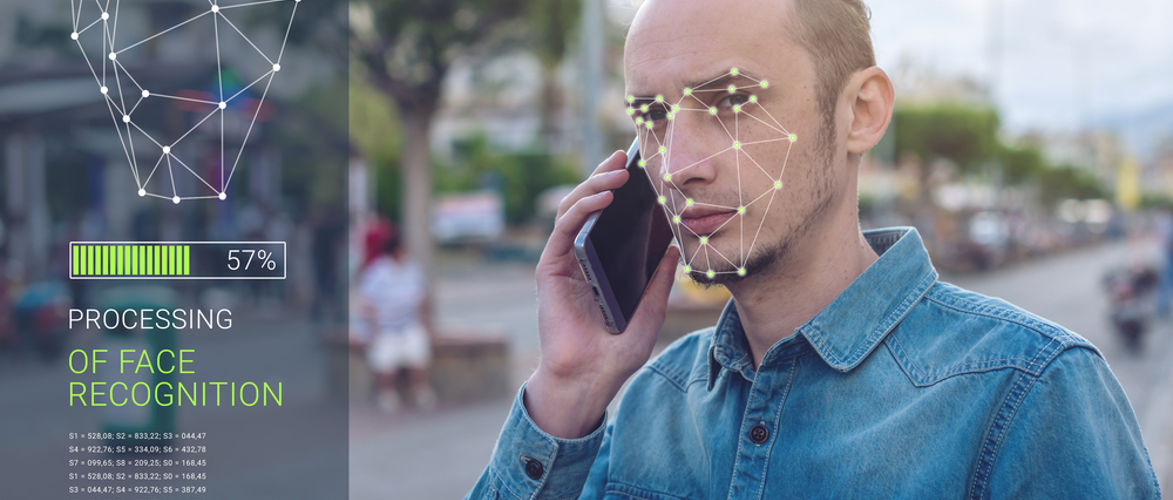By Bernhard Loyen.
On January 18, the New York Times published an article that has attracted a lot of attention in the last few days (1). The article is about a start-up that wants to make money by selling what billions of people are mindlessly offering in their spare time. Data, in this case pictures, portrait photos. This easily stocked treasure chest, nowadays a hard disk, is now being offered to the market in connection with the app developed for it. This time, however, it’s not about the nonsense Trallala à la Snapchat or TikTok. This time, it’s possibly about the end of happiness.
Over and over again – data is the new oil. Sources of income for smart, technically savvy citizens. According to the article, the US company Clearview AI has collected three billion publicly accessible image files in the last years. This means that, at least in this respect, there is no criminal intent to have acquired the images unlawfully, through illegal access to user accounts.
No, such images, presented daily on the well-known social media platforms by completely careless users, possibly with a discreet remaining consciousness users for the interested humanity. The company Clearview AI additionally developed a face recognition technology, which works as follows.
A company, institution or authority takes a photo of a person or uses the still image of a surveillance camera, uploads it to the app and immediately receives public photos of this person together with the appropriate links to the places where these photos appeared. So smart, so questionable. Well, this app will not be available for download in well-known stores.
No, the inventor Mr. Ton-That, an Australian engineer living in the USA, is believed to have offered his product preferentially to law enforcement agencies. And it’s not just law enforcement. Clearview AI has also licensed its app to at least a handful of companies for security purposes. This fact is fuelling the current debate on the question – is he allowed to sell his data collection in connection with his “innovative” idea to a corresponding market?
According to the article, the company has so far refused to provide a list of the institutions that have already purchased its product, i.e. are working with it. Eric Goldman, co-director of the High Tech Law Institute at the University of Santa Clara is quoted as follows:
“The weaponization possibilities of this are endless”(…) “Imagine a rogue law enforcement officer who wants to stalk potential romantic partners, or a foreign government using this to dig up secrets about people to blackmail them or throw them in jail.” (1).
Discussions about uncontrolled, i.e. worrying developments in this industry are not new. As early as 2011, then CEO of Google Eric Schmidt was extremely critical, quoting: Schmidt also said that Google had developed a face recognition technology but had decided not to pursue it further: “We built that technology, and we withheld it. As far as I know it’s the only technology Google has built, and, after looking at it, we decided to stop.” He explained that he was “very concerned personally about the union of mobile tracking and face recognition”, fearing that it “could be used in a very bad way” (2).
Seeing Is IDʼing is a very revealing study by the Center for Technology and Democracy published in 2012 (3). Explanations at that time, quote:
“Facebook took a slightly different approach. Facebookʼs facial recognition feature is also activated by default for the social networking siteʼs users. When a Facebook user with facial recognition functionality activated uploads a photo to Facebook, Facebook will automatically locate faces in the photo that resemble the userʼs Facebook friends and will suggest the user tag the photo with the friendsʼ names. According to Facebook, facial recognition-based tags will only be suggested for friends that the user communicates with most frequently.”
In 2012, the conclusion was, quote: “The privacy issues associated with facial recognition are compounded by the wide availability of this powerful technology. Facial recognition is no longer used just by entities with substantial technical and financial resources, such as government agencies or corporate actors; the sophisticated capability to detect unique facial characteristics is making its way into handheld consumer devices and free software packages, opening the door to many millions of users. With such a broad user base and wide variety of applications, facial recognition technology will be abused.”(3).
Eight years later, the media is surprised that the technology has progressed further and people or companies want to make money of it. Necessarily, financiers have to be found beforehand. Those who invest money into a start-up typically have their own interests in the technical development. The US billionaire and Paypal co-founder Peter Thiel invested in Clearview AI (4). Not surprisingly, he is also an investor in Facebook. The fact that Mr. Thiel co-founded another company – Palantir – makes it interesting.
Palantir Technologies, Inc. is a privately held US-American provider of software and services specializing in the analysis of large amounts of data. These capabilities were identified in particular by the United States Intelligence Community (USIC), specializing in anti-terrorism analysis for the US Department of Defense.
Since federal policymakers have recently decided to no longer rely on Made In Germany products, experts and programs are required and often imported at high prices. For example, the Palantir Gotham program for the Hessian Ministry of the Interior. German pioneer, i.e. door opener in this billion market. But to avoid that this is noticed immediately and communicated negatively, the product is renamed. Palantir Gotham becomes Hessen-Data.
The theoretical terror threat, as well as the recent scenarios that supposedly could not be prevented, need technical solution models. The Minister of the Interior De Maziere, CDU, already knew this in 2017, quote:
“A strong state must keep up with the latest technologies and applications used in the private sector and be able to use them in its work. This includes the use of DNA analysis, which is still highly restricted by law. We need much more biometric analysis, for example for facial recognition. Facial recognition is a powerful tool when searching for a fugitive terrorist suspect.”(5).
The CDU colleague Bouffier, Minister President of Hesse, took up this idea and in April 2018 ordered Palantir Gotham aka Hessen Data from the German subsidiary Palantir Technologies GmbH, based in Wiesbaden (6)(12).
Quote: Data junk for a billion? By secretly and openly boycotting and by using “Trojan counters” hundreds of initiative groups, supported by the GRÜNEN, want to undermine the census planned for May (7). Oh, sorry. That was the wrong quote. It is from the year 1987, when the old FRG tried to have the so-called census conducted. Who is the current government partner of the CDU in Hessen? Right, the GRÜNEN by the way.
The final installation was done by the CDU Minister of the Interior Peter Beuth. Not surprisingly, Hesse received the Big Brother Award 2019. The reason, quote:
“The Hessian Minister of the Interior Peter Beuth (CDU) received the negative award “Big-Brother-Award”. It was awarded to him for the purchase of analysis software of the American company Palantir, which is said to be close to the intelligence agency CIA. The Minister of the Interior had commissioned this highly controversial surveillance company to link and analyse its police databases with social media data and other external data (…) The software of the company, which can link various types of data, is said to be used by American intelligence agencies such as the CIA and NSA as well as the Federal Bureau of Investigation Police FBI.” (8).
We can only speculate about the data that will be backed up for safety reasons when an important update is coming from the USA. After all, it remains on the same server. Therefore – No panic on the Titanic. Udo Lindenberg already knew this in 1972 (9).
Review: In May 2016 the newspaper Die Welt reported, quote: From the surroundings of the Deutsche Telekom we learn that CEO Tim Höttges has recently met with the Palantir management. However, Telekom does not want to mention details (10). In December 2016 the results of the meeting are presented in an interview with a start-up magazine, quote: “In an interview with Berlin Valley, Telekom CEO Tim Höttges talks about innovation in the Group, trips to Silicon Valley and the blue world. Höttges: But what I find most interesting is that we are using more and more artificial intelligence in the company, for example to optimize our network. Or in the call center, where we work with Eliza, a bot that builds standardized processes based on language and where you no longer even notice that you’re talking to a machine. A very exciting big-data project is Palantir, where we are trying to use artificial intelligence to better predict the entire planning and financial budgeting process in the future.”(11).
Yes, the times we live in are exciting. To sum up. A company from the USA is currently causing excitement and irritation regarding the future of face recognition technologies. The US sponsors of this start-up in turn own companies that have recently provided parts of the German security apparatus with programs to capture data from citizens. Most likely with the friendly license of the data backup of corresponding results. Europe’s largest telecommunications company, based in Germany considers this kind of technology “exciting”.
It is also exciting to study the Palantir dossier on Police-IT. It is linked in the written article version (12). By the way, if you have the word China in your mind’s eye while reading this information, you should google two words for a change. France and Alicem (13).
But all this would not be necessary to discuss if billions of citizens worldwide would not be willing to provide corresponding data for processing free of charge and voluntarily. False or incorrect?
The criminologist Tobias Singelnstein writes in the Grundrechte-Report 2019, quote: “Data are omnipresent, practically no area of our digitalised life can do without them. They form a permanent trace that reflects our personality. For the state and authorities, a treasure of previously undreamt-of possibilities arises from this development (…) From the point of view of fundamental rights, “Hessen-Data” stands in conflict with the right to informational self-determination as a component of the general right of personality from Article 2 Paragraph 1 in conjunction with Article 1 Paragraph 1 of the constitution of the Federal Republic of Germany. In particular, mass data evaluations such as those possible with “Hessen-Data” call into question the principle of purpose limitation, which is central to data protection law (14).
January 21 marked the 70th anniversary of the death of George Orwell. Would he take note of the facts presented in amazement or just laugh heartily? His novel 1984 was published on the 8th June 1949. At the moment it is only the allusions of parallels. However, the distances between the changes from impressive fiction to worrying reality are getting shorter with every following decade. Researching today’s text, I found the following lines (15), quote: “Purchasing devices that constantly monitor, track and record us for convenience or a sense of safety is laying the foundation for an oppressive future.”. So simple, so true.
There is the page Surveillance under Surveillance. Surveillance under supervision. Resourceful citizens feed this site, which is just a fact. Surveillance of citizens. The page gives the opportunity to find out how many cameras in your city, in your neighbourhood, are now installed as a matter of fact on buildings, privately and institutionally (16) and thus document the movement of the citizens. Berlin is now ranked 19th among the most monitored cities in the world. 39,765 cameras for 3.7 million inhabitants – as of July 2019 (17).
One could give endless examples of how this society is spiraling further and further into Orwellian dimensions. Is there hope? Yes and no. A few days ago, extracts from the so-called White Paper, which is to be presented by the EU at the end of February, were leaked, quote: “The leaked Commission white paper floats the idea of a three-to-five-year period in which the use of facial recognition technology could be prohibited in public places — to give EU lawmakers time to devise ways to assess and manage risks around the use of the technology, such as to people’s privacy rights or the risk of discriminatory impacts from biased algorithms.”(18).
Sounds ambitious at first, but quote: “This would safeguard the rights of individuals, in particular against any possible abuse of the technology,” the Commission writes, adding that: “It would be necessary to foresee some exceptions, notably for activities in the context of research and development and for security purposes.”(18).
Does the wording of the exceptions for security purposes include those that already exist or those that citizens can still expect? Have we, the people, learned anything in the last centuries?
What is enlightenment?
“Enlightenment is man’s emergence from his self-imposed nonage. Nonage is the inability to use one’s own understanding without another’s guidance. This nonage is self-imposed if its cause lies not in lack of understanding but in indecision and lack of courage to use one’s own mind without another’s guidance. Sapere aude. Have the courage to use your own understanding, is therefore the motto of the enlightenment(…)”.
Laziness and cowardice are the reasons why so many people, having long since acquitted nature from foreign guidance, nevertheless like to remain nonage throughout their lives; and why it is so easy for others to become their guardians. It is so convenient to be nonage.
Immanuel Kant, Answering the Question: What is Enlightenment? December 1784 (19)
Sources:
- https://www.nytimes.com/2020/01/18/technology/clearview-privacyfacial-recognition.html
- https://www.forbes.com/sites/frederickallen/2011/06/01/eric-schmidt-admits-screw-up-identifes-the-big-four-of-the-internet/#50fd6cc413a2
- https://cdt.org/wp-content/uploads/pdfs/Facial_Recognition_and_Privacy-Center_for_Democracy_and_Technology-January_2012.pdf
- https://clearview.ai/
- https://www.faz.net/aktuell/politik/inland/thomas-de-maiziere-leitlinienfuer-einen-starken-staat-in-schwierigen-zeiten-14601852.html? printPagedArticle=true#pageIndex_3
- https://www.spiegel.de/netzwelt/netzpolitik/palantir-software-polizeihessen-kauft-bei-umstrittenem-us-unternehmen-a-1201534.html
- https://www.spiegel.de/spiegel/print/d-13522320.html
- https://ilmr.de/wp-content/uploads/2019/06/MedienechoBBA2019-Auswahl.pdf
- https://www.youtube.com/watch?v=nbWt1f13Ia4
- https://www.welt.de/print/die_welt/wirtschaft/article154980295/Geheimsache-Palantir.html
- https://berlinvalley.com/telekom-chef-tim-hoettges-fehlerkultur/
- https://police-it.org/dossiers-2/das-palantir-dossier/it-dersicherheitsbehoerden-quo-vadis
- https://www.heise.de/newsticker/meldung/Trotz-Kritik-Frankreich-startet-Online-Identitaetsnachweis-mit-Gesichtserkennung-4546332.html
- https://netzpolitik.org/2019/big-data-bei-der-polizei-hessen-sucht-mitpalantir-software-nach-gefaehrdern/
- https://www.nbcnews.com/think/opinion/google-nest-or-amazon-ringjust-reject-these-corporations-surveillance-ncna1102741
- https://kamba4.crux.uberspace.de/#what
- https://www.comparitech.com/vpn-privacy/the-worlds-most-surveilledcities/#CCTV_crime_and_safety
- https://techcrunch.com/2020/01/17/eu-lawmakers-are-eyeing-riskbased-rules-for-ai-per-leaked-white-paper/
- https://www.uni-muenster.de/FNZ-Online/wissen/aufklaerung/quellen/ kant.htm
+++
Thanks to the author for the right to publish.
+++
Picture reference: Artem Oleshko/ Shutterstock
+++
KenFM strives for a broad spectrum of opinions. Opinion articles and guest contributions do not have to reflect the views of the editorial staff.
+++
You like our program? Information about support possibilities here: https://kenfm.de/support/kenfm-unterstuetzen/
+++
Now you can also support us with Bitcoins.

BitCoin address: 18FpEnH1Dh83GXXGpRNqSoW5TL1z1PZgZK










Kommentare (0)